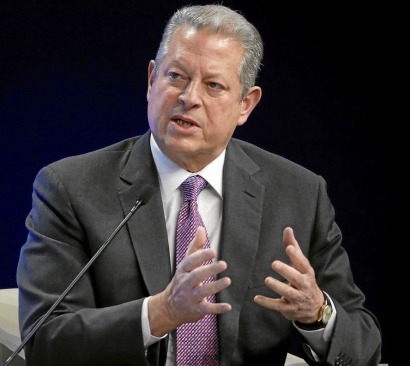
Speaking at the World Economic Forum in Davos-Klosters, Switzerland, Gore presently in 13 countries the price of electricity derived from solar "is equal to or cheaper than the grid average price, and projections are that over the next decade -- and perhaps sooner -- the vast majority of people in the world will live in regions where that is true."
While acknowledging that the economics are renewable energy -- in terms of declining costs -- are more stubbornly resistant to change than the economics of other technologies, he nevertheless expressed optimism about the future of the sector.
"[The cost reductions] we've seen are not as steep as Moore's Law and computer chips, but it has been very impressive, and it is opening up great opportunities for the world to really solve the climate crisis," Gore said.
Moore's Law is a formulation of Gordon Moore, a co-founder of Intel Corporation. In April 1965, he published an article in which he observed that the number of transistors on integrated circuits doubles approximately every two years, and has power and performance of our technologies increase, the costs associated with them continually go down.
Gore spoke as part of a panel discussion, "Changing the Climate for Growth and Development," moderated by Mishal Husain of the BBC.
During his comments, the former vice president was cautiously optimistic that political momentum is building towards action on climate change.
"I think we're getting closer to a political tipping point, although we're not there yet," he said. "Extreme weather events, which are now 100 times more common than they were just 30 years ago are really capturing people's attention."
However, Gore said, despite the havoc climate change has unleashed, displacing millions in the wake of super typhoons and massive hurricanes, man-made harms to the environment continue relatively unabated.
"We continue to put 90 million tons of global warming pollution into the atmosphere every day, as if it was an open sewer," he said.
"According to NASA, the extra heat we trap every day due to accumulated man-made global warming pollution is equivalent to the heat that would be generated if we ignited 400,000 atom bombs, the size of the one dropped on Hiroshima, every single day."
Gore praised the climate change initiatives of business leaders but underscored the need for decisive political action. “Even with business leadership we will need governmental actions,” he said. “We need to put a price on carbon. We need to put a price on denial in politics.”
His comments come in the run-up to the United Nations Climate Change summit in September. Ban Ki-moon, Secretary-General of the United Nations, speaking on the same panel, issued a plea to global leaders to seize the opportunity presented by the summit.
“Instruct your negotiators with firm and decisive action,” the Secretary General said. “Our objective is to raise political will and to catalyse ambitious and decisive actions on the ground.”
Joining Gore and Ban Ki-moon on the panel were William H. Gates III, Co-Chair, Bill and Melinda Gates Foundation, USA; Jim Yong Kim, President of The World Bank; Ngozi Okojo-Iweala, Co-ordinating Minister for the Economy and Minister of Finance of Nigeria; Paul Polman, Chief Executive Officer of Unilever; and Erna Solberg, Prime Minister of Norway.
On the question of whether a renewed emphasis on climate change might detract from the agenda to tackle global poverty, Gates said he saw no conflict. “I don’t think it’s necessary that focusing on climate change should take away from the development agenda.”
But when it comes to renewable energy. Gates was less optimistic than the former vice president.
"In energy, despite the progress we've seen, reliable energy requires storage and requires getting the economics to be even better. {Given that reality,] it's disappointing that the research and development funding has not been a budgetary priority -- and the economic crisis made it even easier not to this," he said. "After all, the prevailing thinking goes, those investments only pay off in the 10 to 20 years time frame, particularly when you add in the deployment complexities associated with those technologies."
Gates continued: "One thing we have to be mindful of is as the poorest are being lifted up [economically], as they are getting lights and refrigerators, and so on ... we are going to use more energy. There is not a solution here where we use less energy. So we have to make sure that the energy we use does not emit any greenhouse gasses, particularly, CO2."
For additional information:

